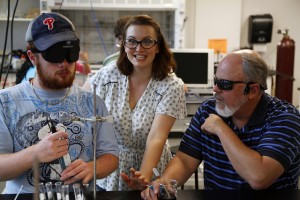Thirsty for a Strong Instructional Practice?
Given the tremendous diversity of students at MSU Denver, using only in-class, written tests to assess all students doesn’t allow us to truly measure what students have learned; instead, we sometimes end up simply testing their ability to take exams.
 Take a SIP of this: Universal Design for Learning
Take a SIP of this: Universal Design for Learning
Universal Design for Learning (UDL) advocates recommend varying your assessments to give students multiple ways to demonstrate to you that they are learning. Here are a few key principles of universal design for assessment and a couple of examples of their application.
You might consider varying your assessments along three dimensions:
- Formative and summative assessment
- In-class and out-of-class assessment
- Convergent and divergent thinking
Here are two assignments that illustrate these different assessment dimensions.
For example, you could offer online assessments that are formative, out-of-class, and require convergent thinking, such as weekly quizzes that focus on the ideas in the week’s readings. Using Blackboard to administer the quizzes keeps this idea from becoming too onerous. In order to make these quizzes formative and help students monitor their learning, Blackboard can be programmed to return the students’ scores along with lists of correct/incorrect questions (but not the correct answers) immediately, and permit students to take the quizzes as many times as they like. Since students take the quizzes at a time and location of their choosing and more than once, common testing accommodations such as extended time and distraction free environment are addressed without having to make special arrangements. And Blackboard automatically scores the quizzes for you!
In contrast, you could offer a Final Assignment that is summative and requires students to think divergently to demonstrate their learning in class. The Final Assignment could ask one “big picture” question: “what did you learn this semester”? Then provide students with three broad “reflection questions” to help focus their thinking and structure their project: What did you learn? Why is it important to you? Now what will you do with this new knowledge?
Still thirsty? Take another SIP of Universal Design for Learning
- For an elaborated explanation of the ideas visit The Well: A Resource for MSU Denver Faculty Interested in Strong Instructional Practices http://sites.msudenver.edu/sips/
- Dr. Mislevy, leading expert in educational assessment, technology, and cognitive science, shares his insights on the integration of UDL and assessment. Dr. Mislevy points out that a principled application of UDL can increase the value and validity of large scale assessment for a greater number of students. http://www.udlcenter.org/resource_library/articles/mislevy
- Reducing cognitive, linguistic, executive, and affective barriers is of vital importance in postsecondary settings as students negotiate college and university expectations differently, according to their widely ranging background experiences. http://udloncampus.cast.org/page/assessment_udl#.VSyn59F0y00
- Learn how UDL can help to increase the accuracy and fairness of classroom assessment. http://www.ascd.org/publications/books/101042/chapters/Using-UDL-to-Accurately-Assess-Student-Progress.aspx
